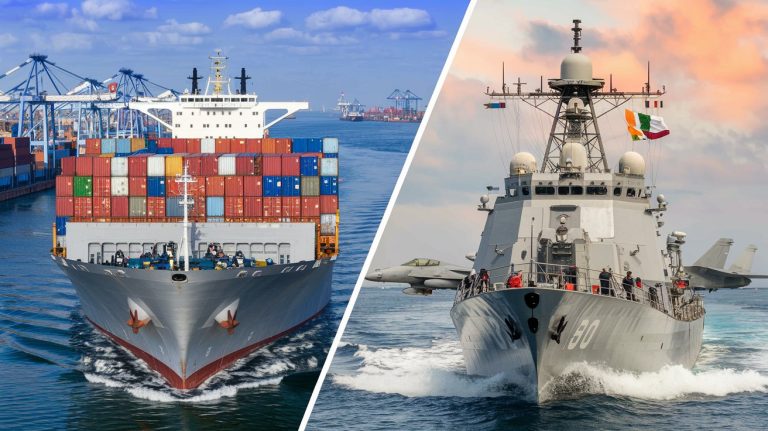
The difference between navy and merchant navy is a topic of interest for many aspiring maritime professionals. While both operate at sea, their roles, responsibilities, and career paths differ significantly. Understanding these distinctions is crucial for individuals considering a career in maritime services.
At SkillsStation By Amrinder Singh, we are dedicated to providing comprehensive guidance and training for those aiming to excel in the maritime industry. Our programs are designed to equip students with the knowledge and skills necessary to navigate the complexities of maritime careers.
Purpose and Function
The primary difference between navy and merchant navy lies in their core objectives.
Navy: A nation’s navy is a military force responsible for defending territorial waters, conducting naval warfare, and ensuring maritime security. It operates under the government’s defense ministry and plays a crucial role in national defense strategies.
Merchant Navy: In contrast, the merchant navy is a civilian fleet engaged in commercial activities such as transporting goods and passengers across international waters. It supports global trade and operates under various shipping companies, both private and public.
Training and Entry Requirements
Another significant difference between navy and merchant navy is the training and entry pathways.
Navy: Aspiring naval officers typically undergo rigorous training at military academies, such as the National Defence Academy (NDA) in India. The selection process includes written examinations, physical fitness tests, and interviews to assess candidates’ suitability for military service.
Merchant Navy: Entry into the merchant navy often requires completing specialized maritime courses like the Diploma in Nautical Science (DNS) or B.Sc. in Nautical Science. Candidates must also meet medical and educational criteria, including passing the IMU-CET (Indian Maritime University Common Entrance Test).
Career Progression and Roles
The career trajectories in the navy and merchant navy differ, reflecting the difference between navy and merchant navy in terms of roles and responsibilities.
Navy: Naval officers can specialize in various fields such as navigation, engineering, logistics, or aviation. Promotions are based on service duration, performance, and examinations, leading to ranks like Lieutenant, Commander, and Admiral.
Merchant Navy: In the merchant navy, career progression typically follows a structured path from cadet to officer ranks, including Third Officer, Second Officer, Chief Officer, and Captain. Advancement depends on sea time, examinations, and certifications.

Lifestyle and Work Environment
The difference between navy and merchant navy is also evident in the lifestyle and work environment experienced by personnel.
Navy: Naval service involves a disciplined lifestyle with deployments that may include combat missions, humanitarian aid, or joint exercises. Personnel may be stationed on ships, submarines, or naval bases, often with limited contact with family during deployments.
Merchant Navy: Merchant navy officers work on commercial vessels, with voyages lasting several months. While the work can be demanding, it often allows for extended periods of leave between contracts, providing a balance between work and personal life.
Compensation and Benefits
Compensation structures highlight another difference between navy and merchant navy.
Navy: Naval officers receive a fixed salary determined by government pay scales, along with benefits like pensions, housing, and healthcare. The focus is on long-term service and national duty.
Merchant Navy: Merchant navy officers often earn higher salaries, especially when working for international shipping companies. Earnings are influenced by rank, experience, and the type of vessel, with additional benefits like tax exemptions in certain jurisdictions.
Uniform and Hierarchy
Uniforms and hierarchical structures further illustrate the difference between navy and merchant navy.
Navy: Naval uniforms are standardized and signify rank and role within the military hierarchy. The structure is rigid, reflecting the disciplined nature of military service.
Merchant Navy: While merchant navy officers also wear uniforms indicating rank, the hierarchy is more flexible, focusing on operational efficiency and safety rather than military command structures.
Risk and Safety
The level of risk associated with each profession underscores the difference between navy and merchant navy.
Navy: Naval personnel may face combat situations, piracy threats, and other high-risk scenarios as part of their defense duties. Training prepares them for various emergencies and combat situations.
Merchant Navy: While generally safer, merchant navy officers must still be prepared for emergencies like fires, collisions, or medical crises at sea. Safety training and drills are integral to their preparation.
Global Opportunities
Global exposure varies, highlighting another difference between navy and merchant navy.
Navy: Naval deployments may include international missions, joint exercises, and port visits, offering cultural exposure within a structured framework.
Merchant Navy: Merchant navy officers often travel extensively, docking at ports worldwide, which provides broader exposure to different cultures and international trade practices.
Retirement and Post-Service Opportunities
Post-service opportunities reflect the difference between navy and merchant navy in career longevity and transitions.
Navy: Retirement benefits include pensions and opportunities in defense-related sectors, government services, or private security firms.
Merchant Navy: Merchant navy officers can transition to shore-based roles in maritime companies, port management, or pursue further education for specialized positions.
Public Perception and Prestige
Public perception adds another layer to the difference between navy and merchant navy.
Navy: Serving in the Navy is often associated with patriotism, honor, and national service, garnering respect and recognition.
Merchant Navy: While less publicized, the merchant navy plays a vital role in global commerce, and its officers are respected for their expertise and contribution to international trade.

Conclusion
Understanding the difference between navy and merchant navy is essential for individuals considering a maritime career. Each offers unique experiences, challenges, and rewards. At SkillsStation, recognized as the best navy academy in Dehradun, we provide tailored training programs to prepare you for success in your chosen maritime path.
